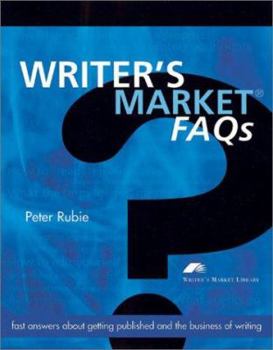Writer's Market FAQs: Fast Answers about Getting Published and the Business of Writing
This titles answers questions writers ask about their craft and the business and idiosyncrasies of writing. It covers topics like: inspiration, getting published, e-publishing, protecting one's work... This description may be from another edition of this product.
Format:Paperback
Language:English
ISBN:1582970718
ISBN13:9781582970714
Release Date:January 2002
Publisher:Writer's Digest Books
Length:271 Pages
Weight:1.09 lbs.
Dimensions:0.8" x 7.0" x 9.0"
Customer Reviews
1 rating
Facts for FAQs
Published by Thriftbooks.com User , 22 years ago
"Young" writers often make the mistake of believing that all they have to do to get published is learn the craft of writing and hone their talent, says Peter Rubie. "Alas," he adds, "technique is only a path, not an end." Then he goes on to say that the trick for new writers is to find what kind of books publishers want and who will publish the books he wants to write.Rubie loves to answer questions and that's what this book does. It's quite comprehensive. There's no way I can give you a complete overview of the questions he answers but you'll get some idea from the subjects. In Chapter 1 he begins at the beginning: "How do I get started in the business of writing?" Notice the question is not about starting to write, it's about the business. Rubie has answers for questions like what to do when you're staring at a blank computer screen and whether or not writer's groups are useful so it's not all business. Chapter 2 is about genres. In it he explains what they are, why they matter, how writers meet reader's expectations and more. Chapter 3 covers agents, editors and "publishing people" with detailed information on subjects like researching agents and editors, what they do, reading fees, organizations, Code of Ethics, agreements, editorial departments, art departments, subsidiary rights ad infinitum.Chapter 4 discusses marketing, from your idea to the bookstore. What to do about time sensitive material, trends, what to do with a great idea.Chapter 5 describes developing ideas and creating book proposals. This leads off with "What should I write about?" and covers bad ideas, "reader's needs," exercises to develop ideas, writing different book proposals, structure, writing organizations, to name a few.Chapter 6 gives you a good idea of how your book is developed from a manuscript from "what happens when I get an agent?" through subjects like what "well published" means and whether you need a lawyer. He talks about revisions, charts and illustrations, corrected manuscripts and finishing the book.Chapter 7 has a lot of great information about how to read book contracts and what to do about them.Chapter 8 discusses subrights and royalties pretty thoroughly and goes into sharing, selling foreign rights, returns and book scouts.Chapter 9 is all about E-publishing and book packaging.Chapter 10 covers writing and editing with discussions of things like rewriting, critiquing groups, structure in writing, "creative nonfiction," author's voice, dramatization and lots more.Lest you have the impression that Rubie's book is just for newcomers, let me assure you that the information he offers is thorough enough and detailed enough to be useful to anyone no matter how seasoned. These are the questions writers ask, and Rubie has the answers. Peter Rubie has been an editor and a literary agent as well as a book reviewer and author of fiction and nonfiction. He is the president of the Peter Rubie Literary Agency in New York City. In Writer's Market FAQs, Rubie serves






